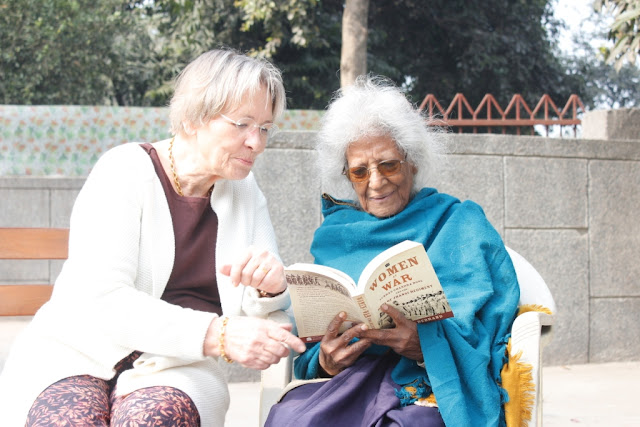Dr. Vera Hildebrand speaks to the surviving Ranis of Jhansi Regiment
Jaipur: Historian Vera Hildebrand is in India for promoting her thoroughly researched book Women at War- Subhash Chandra Bose and the Rani of Jhansi Regiment. She also has a session in the Zee Jaipur Literature Festival on 23rd January at Front Lawns at 11.15 a.m.
‘Women at War’ is an incredible chapter about India’s women during the Indian independence movement, which was merely glossed over in history books prescribed by the country’s academia. The book is not just topical, but it also plugs in a major resource gap for Indians to learn and be inspired by.



The book is the result of in-depth interviews carried out over a period of two years with the surviving Ranis of the Rani Jhansi Regiment in their late seventies and nineties – and meticulous archival research of previously unknown top secret records from British Intelligence Services from British Library in London., historian Vera Hildebrand has uncovered extensive new evidence that separates the myth of the Bengali hero and his jungle warrior maidens from historical fact.
The result is a wholly fresh perspective on the remarkable women of the Rani Jhansi Regiment and their place in Indian and world history. The truth is every bit as impressive as the myth.
Some key areas the author has covered in the book:
· The author’s experience in tracking down the surviving members of the Rani of Jhansi Regiment, contacting them and meeting them, in person, for the book
· Subhas Chandra and Mahatma Gandhi: their opposing views towards the freedom movement
· The recruitment process of Ranis for the Indian freedom struggle
· How the Ranis prepared for combat
· Daily routines of the Ranis at camp, and their in-depth accounts of their adventures in Rangoon and Maymyo
· Subhas Chandra Bose’s relationship with women, and the gender dynamics between Indian Ranis and the male soldiers
· Subhas Chandra Bose demanded that women should have equal rights and equal responsibilities .He was many years ahead of his time for advocating women empowerments.
The book has been published by HarperCollins India and is available for sale on amazon .
Vera is India from 14th January to 3rd February. To schedule an interview with the author please contact the below numbers
About the book
On 3 July 1943, Subhas Chandra Bose stepped off a Japanese military plane in Singapore, pledged to finally free India from British rule, and created what was perhaps the first female infantry fighting unit in military history, the Rani of Jhansi Regiment (RJR). His young recruits were from Indian families of the diasporas in Singapore, Malaya and Burma, and consisted entirely of civilian volunteers lacking any prior military training. These women soldiers, deployed to the steamy jungles of Burma during the two last years of World War II, were determined to follow their commander to victory and to the liberation of India. More than seven decades later, their history has been forgotten, and their service and the role played by Bose himself unexplored with true rigour.
Through in-depth interviews with the surviving Ranis in their late seventies and nineties – and meticulous archival research, historian Vera Hildebrand has uncovered extensive new evidence that separates the myth of the Bengali hero and his jungle warrior maidens from historical fact. The result is a wholly fresh perspective on the remarkable women of the RJR and their place in Indian and world history. The truth is every bit as impressive as the myth.
About Dr. Vera Hildebrand: Vera has a doctorate in Indian history and culture from Georgetown University, Washington, DC. She is a senior research fellow at the Nordic Institute of Asian Studies at University of Copenhagen, Denmark. Previously, she taught at Harvard University and University of Copenhagen. For Women at War, she travelled to Malaysia, India, Singapore, the United States, Great Britain and Japan to identify and interview all surviving soldiers of the Rani of Jhansi Regiment of the Indian National Army, as well as Indian and Japanese soldiers who had worked with the RJR in World War II in Burma. Vera is in India from 14th January to 3rd February.
